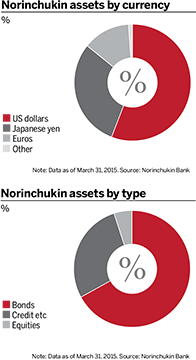The poor state of Japan's farmland, fishing grounds and forests should spell bad news for the co-operative financial operation that traditionally caters to these fields – Norinchukin Bank. However, as its CEO explains, the lender's overseas activities and the country's thirst for innovation have seen it post record profits recently.
Japan’s abandoned farmland is growing, its fishing grounds are deteriorating and private forests – which account for 70% of the country's forest area – are being neglected. Much of this is down to Japan's shrinking workforce and ageing population, which mean fewer operators in the agricultural, fisheries and forestry communities.
Within Japan’s extensive regional banking network, co-operatives – Japan Agricultural Cooperatives (JA), Japan Fishery Cooperatives (JF) and Japan Forestry Cooperatives (JForest) – and their banks are trying to reverse these trends. These three co-operative banks are gathered under a single umbrella that is the national-level Norinchukin Bank.
Double role
Historically, JA, JF and JForest lent to local corporates and individuals in their own right. But five years ago, Norinchukin started lending directly to large-scale agricultural, fisheries and forestry corporates. It also launched a Y2000bn ($16.5bn) programme in November 2014 to revitalise the local economy and boost agricultural income.
Editor's choice
“In that sense we have two faces. On the one hand we have a role as an international institutional investor. On the other hand we provide agricultural, fishery and forestry industries with financial services,” says Norinchukin president and CEO Yoshio Kono.
Norinchukin is also performing strongly despite the difficulties faced by Japan’s banking sector: Bank of Japan has maintained a low-interest-rate environment for more than a decade. This means interest income has remained low and banks have had to find new revenue sources. Nevertheless, Norinchukin reported a record-high performance in financial year 2014, with recurring profits reaching Y514.5bn and net profits after tax reaching Y411.3bn.
Norinchukin is also Japan’s fourth largest bank by Tier 1 capital, following Japan’s three mega-banks (Mitsubishi UFJ Financial Group, Sumitomo Mitsui Financial Group and Mizuho Financial Group), according to The Banker Database.
International investment

While Japan’s mega-banks have developed some new business lines and expanded operations abroad to diversify revenue sources, Norinchukin has opted for significant overseas investment: roughly 60% of its Y90,000bn portfolio is managed outside Japan.
“Other Japanese banks are trying to promote investment trusts or insurance products for retail individuals to increase fee-based revenue. But we focus on diversifying our investments in various asset classes around the globe. If we only had operations domestically, it would have been harder for us,” says Mr Kono.
Of Norinchukin’s market assets, 56% are in the US, where it mainly invests in high-quality, stable fixed-income instruments including US treasuries and agency bonds. “We enjoy the spread of long- and short-term interest rates. In addition, the depreciation of the Japanese yen favoured us in terms of profits because we mainly invest in US dollars,” says Mr Kono.
But as the Federal Reserve looks to increase interest rates, such exposure to the US could now pose a risk. As soon as rates rise, the price of Norinchukin’s US dollar bonds will drop. However, Mr Kono is not concerned. “We want to continue investing in the US under sound risk management,” he says. US dollar investment also provides Norinchukin with a hedge against foreign exchange risk when investing in other foreign currency bonds, he adds.
Aside from US dollars, 13% of Norinchukin’s market assets are in euros and 30% are in yen. Only 1% is left to other currencies. Though Norinchukin would like to invest more in Asia, the region’s bond markets still remain relatively undeveloped, says Mr Kono.
An enormous deposit base of Y40,000bn helps the lender hedge its significant investments abroad. Norinchukin Bank member Japan Agricultural Cooperatives Bank has an even larger individual savings base of Y94,000bn, which is beyond even mega-banks’ levels and accounts for 10% of overall individual savings in Japan.
A chunky BIS capital adequacy ratio of 24%, which is double the Japanese mega-banks’ average of 12% and three times the 8% international standard, further helps Norinchukin hedge foreign exchange risk. “All the principal is hedged,” says Mr Kono.
National recovery
Despite operating in a choppy banking and macroeconomic environment, Mr Kono believes in a Japanese recovery. Before the second administration of prime minister Shinzō Abe in 2013, Norinchukin's corporate clients were going bankrupt at a rate of roughly one a month. “[But] many Japanese listed companies recently accomplished record-high financial results,” says Mr Kono.
Significantly, small and medium-sized enterprises (SMEs) are starting to be financially supported by mega-banks, which is good for the local economy but might be trickier for SME lenders such as Norinchukin. “Large enterprises are cash-rich now and don’t have large borrowing needs. Large banks are now trying to lend more to SMEs. In fact, regional lenders – which have historically lent to SMEs – are having a harder time because of more severe competition,” says Mr Kono.
Greater corporate capital expenditure, increases in individual consumer spending and a rise in exports, thanks to a depreciated yen, all point to a recovery. “As Japan continues to face labour shortages, we expect Japanese companies to increase capital expenditure in labour-saving equipment and technology, which could bring the domestic economy onto a sustainable growth path,” says Mr Kono.


